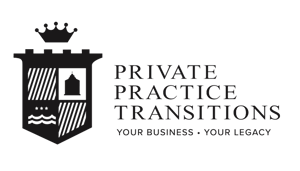Purchasing an existing practice can be a pivotal moment in your professional career, offering you the opportunity to build upon an established foundation. However, before you put your name on a contract’s dotted line, it’s critical to carry out due diligence and ensure you’re fully informed about the practice you’re about to acquire. Our top questions to ask an owner before buying their business can help uncover the details that matter most and secure your chance of long-term success.
What Is Your Motivation for Selling?
One of the most important questions you should ask the owner is why they are selling the business. Their motivation can provide critical insights into the state of the practice itself.
If they are selling because they want to retire, relocate, or make more time for family commitments, you may have no cause for alarm. However, if the owner hints at declining profits, market challenges, or operational difficulties, you’ll want to dig deeper to understand how these factors could impact your investment.
Understanding the owner’s motivation can also illuminate their level of commitment to ensuring a smooth transition. For example, someone selling due to burnout or health concerns may provide less transitional support, whereas a retiree invested in their legacy may be more eager to play a role in the transitional phase.
Can You Tell Me About Your Practice’s History?
It is also wise to get a sense of the business’s history. Ask the owner about their initial goals and the evolution of those goals since the business’s inception.
You should also discuss the challenges they’ve faced over the years and how they overcame them. Pay close attention to their answers, as they will shed light on their leadership style and decision-making process. Additionally, you’ll want to find out if the practice has undergone any rebranding, relocations, or significant structural changes that may influence how people view it.
Do You Have Any Co-Owners?
Another good question to ask an owner before buying their business is whether they have any co-owners or partners. If they do, you’ll need to learn about their stake in the practice. Are they fully aligned with the decision to sell, or could there be disagreements? Clear communication around co-owner dynamics is crucial, as differing opinions about the sale can complicate and potentially delay the transaction process.
Additionally, inquire about the roles co-owners currently play in the business. Are they actively involved in day-to-day operations, or are they silent investors? If they play a significant role, you’ll need to consider how their departure or change in involvement could impact the practice’s stability. This question also offers insight into whether the current team structure is sustainable or if changes will need to be made in a transition.
How Are Your Revenues?
Revenue is a key indicator of any business’s health, so it’s crucial to gauge this metric as early in the process as possible. Ask the owner for a detailed breakdown of their practice’s revenue streams. Is the income consistent, or are there seasonal fluctuations you need to be aware of?
A practice with multiple revenue-generating services may offer greater financial stability, while one that is heavily reliant on a single offering could expose you to higher risks.
It’s also valuable to understand how the business generates revenue in relation to key customers or clients. For example, if significant client concentration exists, losing their business could severely affect profitability. This is a good opportunity to identify potential revenue vulnerabilities and think about diversification strategies.
May I Review Your Financial Statements?
Requesting access to the business’s financial statements is a crucial step in any acquisition process. These documents are essential for verifying profitability.
Ask for at least three years’ worth of financial information. Consistency in these records indicates that the owner ran the business effectively.
You will also want to review any outstanding debts or liabilities. Carefully evaluate expenses to determine whether they are reasonable and sustainable. Additionally, scrutinize existing vendor agreements, leases, and contracts to ensure that there are no hidden costs or unfavorable conditions that could affect you after purchase.
Financial due diligence is one of the most time-intensive parts of the buying process. Still, it is critical in determining whether the practice is financially viable or in need of a deeper financial investigation.
How Competitive Is Your Market?
It is also crucial to understand the practice’s current market landscape. For example, if you’re looking at an accounting business for sale, ask the owner to describe their local competitors and how they’ve positioned themselves within the market.
Find out if their business has managed to stand out or if larger and more aggressive rivals currently overshadow it. Understanding the competitive dynamics will help you determine whether there is room to thrive in the market or if you will have limited growth opportunities.
Has Personal Loyalty Driven Your Success?
You should also determine whether the current owner’s personal relationships have driven the practice’s success. Although customer loyalty is invaluable, it can sometimes center on the personality or reputation of the owner rather than the business itself. Ask whether key clients or partners are likely to stay on after the sale and gauge their loyalty to the business as an independent entity.
If personal loyalty to the seller has played a significant role, you’ll need to develop strategies to retain those relationships post-sale. For example, consider proposing a transitional period where the seller remains involved to introduce you to these stakeholders and ensure continuity. Understanding this dynamic helps you anticipate potential hurdles and develop proactive approaches to maintain the practice’s reputation and client base.
What Is Your View on the Sector’s Future?
Finally, you should ask the seller about their perspective on the sector’s future. Ask them about industry trends, upcoming challenges, and opportunities they foresee. Learn if any regulations or technological advancements have impacted the industry, or if any pending changes could significantly affect the practice’s operations, profitability, or growth potential.
A well-informed and forward-thinking response indicates that the owner ran the practice with care and attention to market shifts. Conversely, an unclear or overly pessimistic view may be a red flag. Aligning your vision with the sector’s direction is essential for ensuring long-term growth and success under your ownership.
Asking these questions can make you feel more confident and informed about the business you’re looking to aquire. Use them to evaluate a practice thoroughly so that you can confirm you’re on the path to success.
You can also enhance your search with the help of Private Practice Transitions. We can help you develop a plan for purchasing physical therapy or accounting businesses and help you find candidates that will meet your specific needs.






.jpg)
